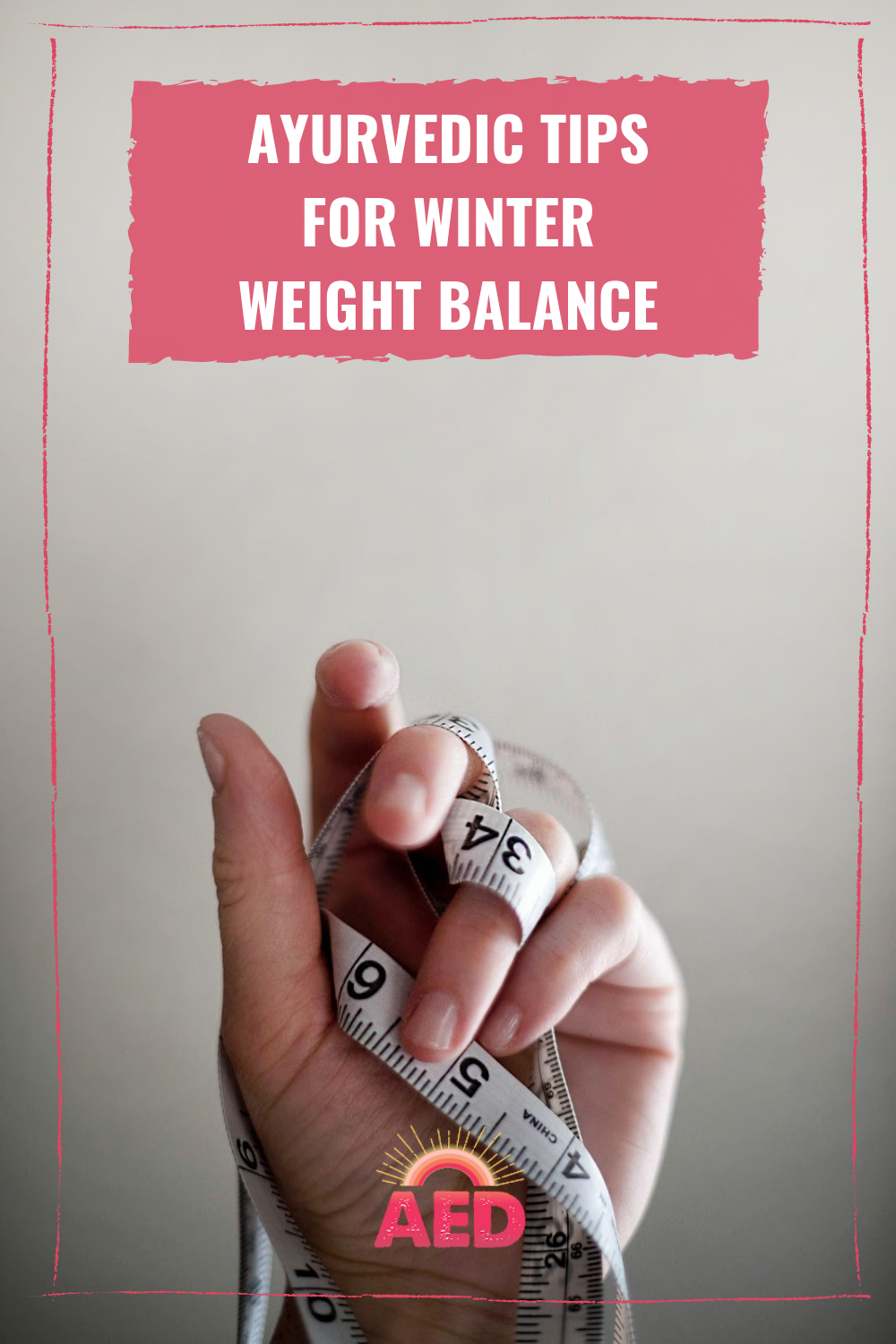
Photo by Jennifer Burk
Have you ever wondered why you tend to put on more weight during the fall and winter seasons?
Some would say that holiday meals are the reason for extra weight. Others would argue that spending more time indoors reading and watching Netflix due in cold and cozy weather is the issue.

Photo by Alex Geerts
What if I told you there was a deeper reason for weight gain?
Ever heard of “False Kapha?”
Let me explain…
It may seem that excess Kapha dosha is the culprit when it comes to weight gain.
For those of you who need a refresher, here are some properties of Kapha that align with weight gain:
- Wet
- Sluggish
- Sticky
- Heavy
- Dull
- Stagnant
It looks like Kapha… Smells like Kapha….
So, it’s easy to assume that you need to balance this dosha to lose weight.
What you may not know is that sometimes, it’s Vata dosha that you need to pay attention to.
Fall and early winter are Vata season.
During these cool and dry seasons, the environment around you will reflect the properties of Vata Dosha, and as a result, those properties will increase inside of you.
Mentally, too much Vata dosha can cause:
- Anxiety
- Fear
- Worry
- Feeling scattered or spacey
- Lack of sleep
- Uncertainty
Many of these symptoms contribute to stress.
It is scientifically proven that when the body is under stress, the adrenal glands release a hormone called cortisol.
What does Cortisol do?
One of Cortisol’s main functions is to block lymphatic drainage, which in excess can cause an increase in Kapha dosha.
When Kapha increases, you may notice excess weight gain around the stomach hips, and thighs. From an Ayurvedic perspective, this is your body attempting to internally balance Vata dosha and make you feel more grounded.
Externally, you may find yourself eating heavier foods for comfort, or spending more time being sedentary in your own attempt to find balance.
But, how do you balance Vata the healthy way and avoid winter weight gain?
Read on to find out!
Ayurvedic Winter Weight Balance Tips

Photo by Lukas Blazek
Schedule Meal Times
Scheduling meal times is the #1 way to avoid the body’s scarcity response.
When the body doesn’t think it will get food for a long period of time, it will go into a state of stress and start to store excess fat that it can pull from to nourish you later.
This is the reason why when you starve yourself or eliminate meals, you find that you start to gain weight.
To avoid this, try planning out your meal times and eating for your dosha.
Ayurveda’s eating rules state that you should Generally, eat breakfast at 8 am, lunch at noon, and dinner at 5 pm. Try to eat within an hour of these times.

Photo by Monika Grabkowska
Eating Seasonally for Winter Weight Balance
During the Vata season, it is important to eat wet natured, warm, and hearty foods. Even when you have excess Kapha, you can eat seasonal Vata balancing foods that will keep you nourished without contributing to excess weight gain. Just don’t go overboard.
Moderation is key!
Vata Season Foods:
Cooked Vegetables
Beets, carrots, garlic, green beans, onions, sweet potatoes, radishes, and turnips.
Broccoli, Brussels sprouts, cabbage, cauliflower, celery, eggplant, leafy green vegetables, mushrooms, peas, peppers, potatoes, sprouts, tomatoes, zucchini
Fruit
Bananas, apricots, berries, cherries, grapefruit, lemons, grapes, peaches, plums, stewed fruits.
Cranberries, pears, pomegranates.
Cooked Grains
Oas, barley, millet
Meats( in moderation)
Chicken, seafood, turkey
Beans and Legumes
Chickpeas, mung Dhal, lentils
Oils
Sesame oil, ghee, olive Oil
Spices
Unless you have excess Pitta dosha, it’s great to add herbs and spices that are more pungent in nature to your foods. The warming nature will balance and Kapha, just be mindful not to add too much as this may aggravate Vata.
Extra Tip: Cold foods can aggravate Vata and increase Kapha. Kapha dosha is a mix of water and earth, and when you cool these elements, they solidify, causing stagnancy that results in weight gain. This means that you’ll want to avoid raw foods and salads.
Psst… Need some tips on how to survive those holiday gatherings? Check out my Ayurvedic Holiday Eating Survival Guide!

Photo by Madison Lavern
Meditate
One of the best ways to stay grounded is with a daily meditation practice.
Meditation has so many benefits. Not only can it support healthy blood pressure levels, but it can also contribute to weight loss due to its ability to reduce stress.
If you’re new to mediation, just know that it is indeed a practice, and there is no such thing as being “good at it” so don’t let that stop you.
You might start with just 5 minutes of meditation a day and work your way up.
Another great tip is to meditate at the stoplights only on our way to work each day.
Practice connecting to your breath and watching your thoughts without responding or reacting until the light turns green.
Not only will your daily commute become more peaceful, but it’s also an easy way to incorporate meditation into your schedule!

Photo by Elena Kloppenburg
Stay Active
Exercise and Yoga are great ways to balance your weight. It’s recommended that you exercise for 45 to 60 minutes l, but even 30 will do!
The most important thing is that you make sure your workout routine is tailored to your body type. This will make it the most effective.
Exercise For Your Dosha
Vata
Low-intensity exercises and yoga flows are your jam! Go for a walk and try yin yoga or yoga glows that challenge you to focus on your form and your breath.
Pitta
You benefit from a workout or yoga flow that challenges you, but intervals are key.
You might want to push through and work out for long periods, but this will cause burn out. Instead, go for short sprints and rest in between.
Kapha
Push yourself a little bit past your limits and strive to work up a sweat. It’s recommended that you opt for more energizing yoga practices and hold your poses for a longer period of time.

Photo by Kinga Cichewicz
Maintain a Healthy Sleep Schedule
In my recent blog post about sleep, I touched on the fact that napping during the day is something that can increase kapha dosha in the body. Instead of taking naps, tailor your bedtime and amount of sleep each night to your body type.
Vata
Recommended amount of sleep: 8-9 hours
Pitta
Recommended amount of sleep: 7-8 hours
Kapha
Recommended amount of sleep: 7 hours

Photo by Bart LaRue
Practice Self-love and Acceptance
This may be last on the list, but don’t be mistaken, It is the most important!
Meeting yourself with unconditional love no matter what is always the quickest route to lasting health and vitality.
When you care about feeling good in your body, you are more likely to take on healthy habits in order to treat yourself well. Balanced weight will be a lovely pize, but it won’t be the destination!
Speaking of Self Love…
Download this free Guide To Abhyanga and Self-Love! This guide to Ayurvedic massage is a great way to get in touch with your body and get your lymph moving at the same time!
Remember to do your best with these tips and take it one day at a time. It’s not a sprint darling, it’s a marathon with long-lasting results.
Did you discover something new today? If so, tell me all about your insights in the comments below. And, don’t forget to share this post with a friend! Support one another on your winter weight balancing journey!







